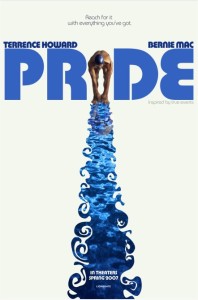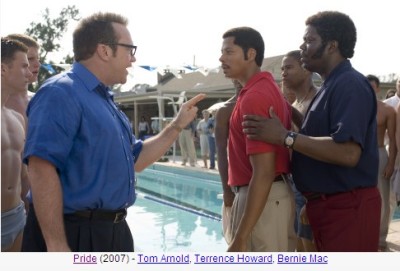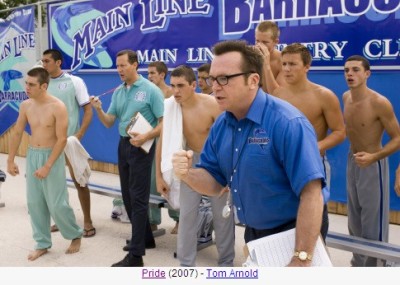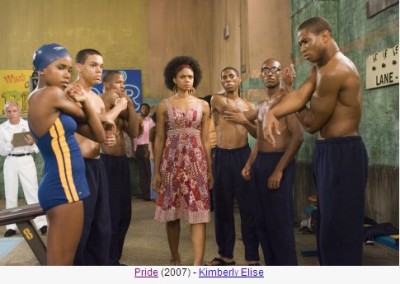By: debbie lynn elias

Inspirational. Uplifting. Hopeful. Encouraging. A three-hankie flick. PRIDE is nothing like I expected despite knowing the film’s backstory and the incredible accomplishments of its subject, swimming coach Jim Ellis. It’s so much more.
Jim Ellis was, and is, a proud man. A student at Cheney State in the 60’s, he was not only an excellent student, but an accomplished swimmer as well. Unfortunately, back in his college days, an African American swimmer in a “white” pool was something not to be tolerated in many communities and something that caused him personal pain. And on graduation, despite his degree in mathematics, he was unable to find a teaching position because of the color of his skin. Everywhere he went, doors slammed in his face, eventually leading him to the one place he thought he would find fairness, and a job – The City of Brotherly Love, Philadelphia. PRIDE is his story.
1970’s Philadelphia, including the ethnically diverse neighborhood of Nicetown, was not always the “nicest” place to be. (And if you were riding the Broad Street subway like I was, you know what I mean.) Crime was up. Center City and Historic Philadelphia, the crown jewels of the City, were falling into disrepair with major merchants vacating premises. Money was short for maintenance and upkeep of not just City streets and buildings, but the very symbols which are most identifiable with our country – places like Constitution Hall, Carpenters Hall, Independence Hall and yes, even Betsy Ross’ House. Throughout the City, cost cutting measures were in effect. One of those measures included eliminating non-necessity services, such as the Marcus Foster Recreation Center in Nicetown which was funded under the auspices of the Philadelphia Department of Recreation (PDR).

With steeled determination, Ellis finally gets a job with the Philadelphia Department of Recreation. His assignment – to close the Marcus Foster Recreation Center, a facility all but abandoned but for the local teens that play basketball outside its closed doors. But things go a little awry with the City’s plans once Ellis arrives in Nicetown. Met with hostility from the Center’s long-time maintenance man Elston, resistence from a local drug-dealer/thug, and hesitant inquisitiveness from the neighborhood kids, Ellis undertakes his assigned task, that is until he discovers a swimming pool within the Center. Long abandoned, it becomes Ellis’ personal mission to restore the pool, if for nothing more than his own personal use and tranquility, well, at least until the City removes the basketball hoops leaving the kids with nothing to do and nowhere to go but inside the soon to be closed rec center.
With a quite genteel manner, Ellis piques the boys’ (and girls) curiosity with the swimming pool. Initially letting the kids fend and flounder for themselves, it doesn’t take long before he envisions his purpose – not to close the rec center, but restore it and at the same time, restore direction and purpose in the kids. Guided by Ellis’ mild manners, the kids are drawn to the idea of swimming and Ellis sees their individual and team potential. Encouraged with their own progress, the kids soon come up with the idea of forming a swim team to compete against other rec centers and schools. Hoping that this would eventually be the case, Ellis jumps in to the endeavor head first.

Forced to confront his own past demons, with determination, dedication and inner fortitude, Ellis shepherds and motivates the PDR team through loss and heartache, gives them guiding lessons for life, encourages them (and succeeds) at getting them to stay in school and eventually, develops what is to this day, not only the nation’s best predominantly African-American swim team, but a championship swim team. And it’s not just the Nicetown kids that have benefitted from Ellis. Entire communities were revitalized and in the past 35 years, the PDR team and Ellis’ methods have become the building blocks for other urban swim teams around the country.

Terrence Howard stars as Jim Ellis and I can’t think of a better person in the role. As Ellis, Howard has a tacit compassion that is, for lack of a better word, inspiring. His genteel mannerisms are perfectly played against the harshness of the neighborhood and the times and carry Ellis’ message far without being preachy. But as good as Howard is as an actor, his lack of swimming ability almost kept him from the role. Openly admitting, “I didn’t swim all that much and didn’t know much about the sport,” it was meeting with Jim Ellis that turned the tide. Ellis welcomed Howard to the role feeling, “This is the right person. Trust him.” Elaborating on his belief in Terrence Howard to portray him honestly, Ellis noted, “He [Howard] has the education, the background and the ammunition to make a contribution to society.” That, in a nutshell, is on the keys to Ellis’ longevity and success and what he instills on young people.
And what about Bernie Mac? As Elston, he has sincerity with an edge, hiding a heart he doesn’t want to show. Undoubtedly one of Mac’s most dramatic roles – and definitely one of his best overall. There is definitely more to him than the buffoonish character he normally plays. Interestingly, Mac was an athletic director at the South Central Community Center in Chicago in his youth which made PRIDE speak to him loudest. Tom Arnold also excels as Main Line swim coach, Bink. (And for those of you unfamiliar with the Philly Main Line – think money, old money, snobbish and Grace Kellyesque lifestyle.) Originally written as somewhat of a racist coach, Arnold skewed Bink so as to make it not so much about race, but about conduct, giving Bink an ingrained streak of negativity in his own coaching methods and conduct and a lack of respect for anything and anyone that doesn’t conform with his ideology. One of Arnold’s most affective roles. Some real standouts are the kids that make up the PDR swim team, among them, Kevin Phillips, Nate Parker, Evan Ross, Brandon Fobbs and Regine Nehy. Impeccable performances. They all captured the psychologic and sociologic essence of the era and are all so compelling and likeable.
Written by Kevin Michael Smith, Norman Vance, Jr., J. Mills Goodloe, and my fellow Philadelphian and Temple alum, Michael Gozzard, the translation of the actual events to the big screen is one of the best I have seen. Not pandering to emotion, the script speaks from the heart with factual street frankness. Key is the fact that Ellis is not portrayed as some demi-god, but a man just like the kids he was inspired to help – one with his own troubles and flaws and still humble to a fault.
Splashing onto the scene with his directorial debut is Zimbabwean Sunu Goneran. With formulaic styling, Goneran’s directorial vision takes on its own shape thanks to cinematographer Matthew Leonetti. With cameras above, below and in the water, the lensing is superb and adds new dimension to the story, enabling the audience to feel like participants. I have to say, Leonetti’s camera work is better than that at recent Olympic games.
As far as production design goes, I am overwhelmed. As Philadelphia has changed dramatically over the past 30 years since Jim Ellis came to town, thanks to efforts of former Mayor (now Governor) Rendell and his successors, much of the squalor has disappeared and redevelopment and prosperity now flourish, thus creating problems for filmmakers. Their solution, post Katrina New Orleans. With the same clapboard/shingle and brick structural styling and street layouts as Philly of the 70’s, the location is ideal. Adding to the eral structure, the clothes (where did they find so much Qiana and polyester??), the cars and the music are all transformative for the audience and set the tone of the period. And I have to say, one of the cutest things I caught was one of the street girls in her platform shoes that were obviously too tight, so she had a wad of tissue stuffed on the side of her foot between her little toe and the sandal strap. I had to laugh as that was one of the most common sites around no matter what the demographic or ethnicity – girls in platforms that hurt their feet with tissues, still trying to look cool.
This is not a sports movie. This is a movie about a man involved in sports. This is Jim Ellis’ story. This is a story of heart, conviction, motivation, determination, pride. People like Jim Ellis were (and still are) few and far between and what he did with the Marcus Foster Rec Center and the boys & girls of PDR and the lives that he began affecting some 30 years ago was, and still is, a ray of hope amid darkness.
Jim Ellis – Terrence Howard Elston – Bernie Mac Sue Davis – Kimberly Elise Bink – Tom Arnold Puddin’ Head – Brandon Fobbs Walt – Alphonso McAuley Willie – Regine Nehy Hakim – Nate Parker Andre – Kevin Phillips
Directed by Sunu Goneran. Written by Kevin Michael Smith, Norman Vance, Jr., J. Mills Goodloe, and Michael Gozzard. A Lionsgate release. Rated PG. (104 min)











